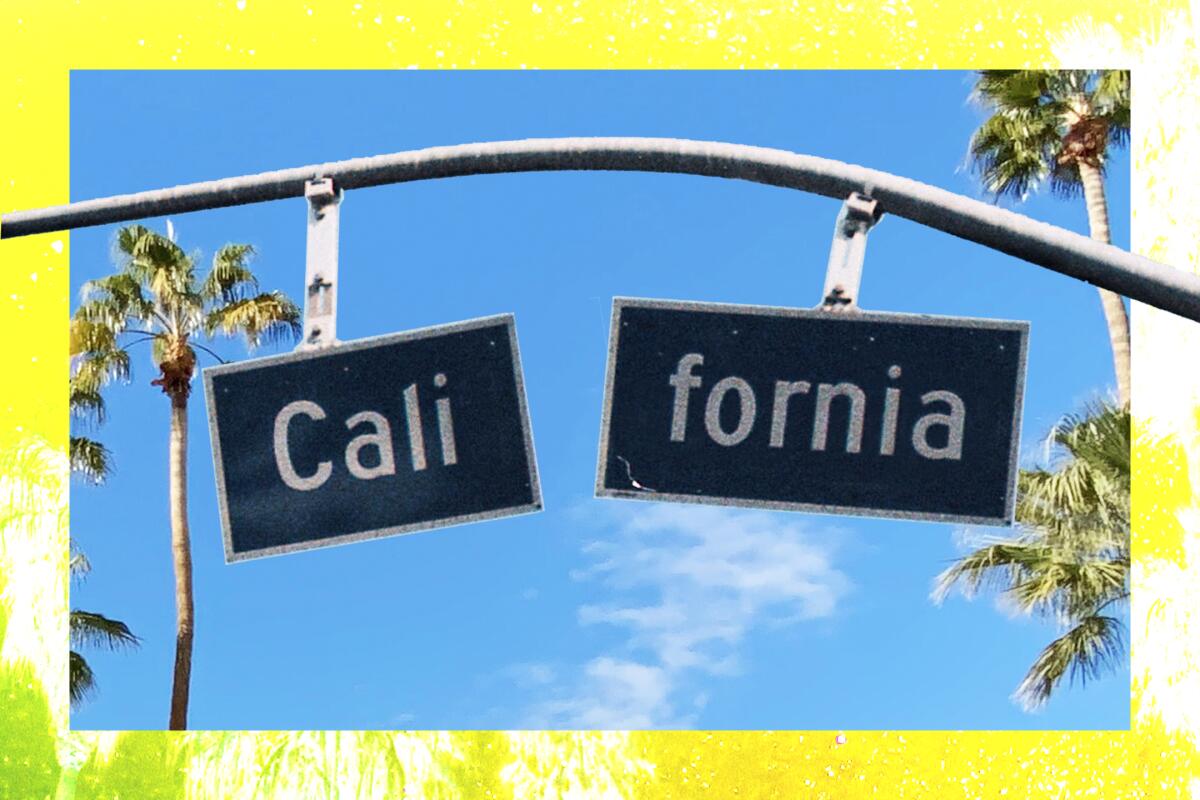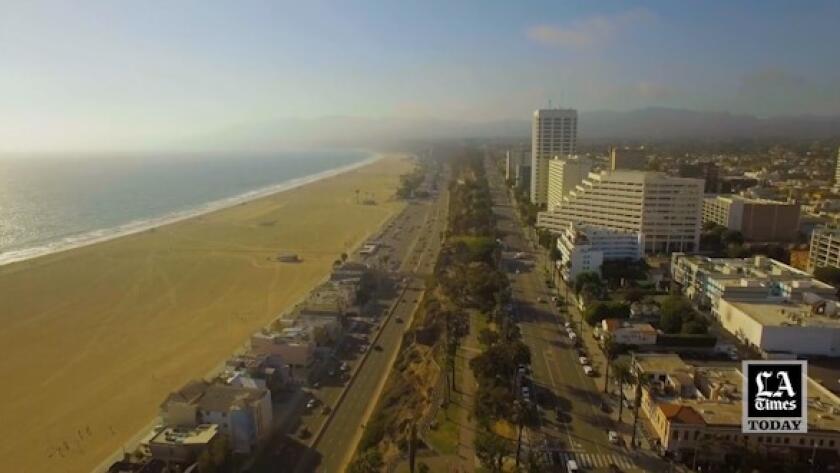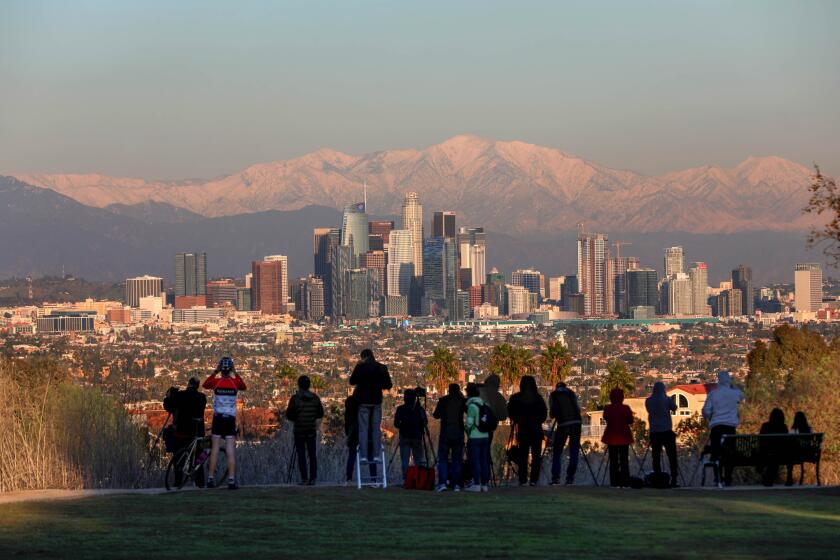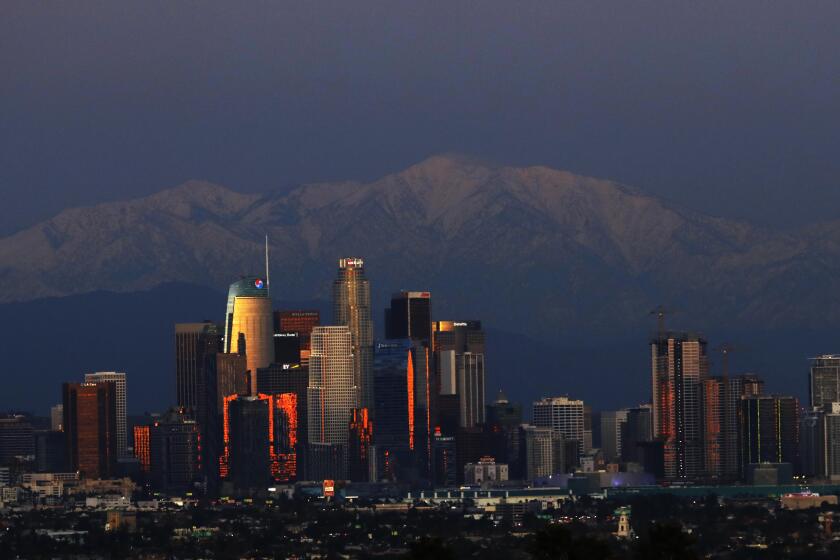Love it or hate it, the nickname ‘Cali’ has a surprisingly long history

- Share via
Last summer, we began asking readers to send us their pressing questions about Los Angeles and California.
Every few weeks, we put the questions to a vote, asking readers to decide which question we should answer in story form.
For the record:
8:01 a.m. June 1, 2022An earlier version of this story attributed a quote to “Adams” instead of “Bradley,” when referring to professor Adam Bradley.
This question, found on Reddit, won second place in a recent reader poll: Do Californians dislike it when California is called “Cali”?
“The Golden State.” “NorCal” and “SoCal.” The loathed “Frisco.”
When it comes to famous — and debate-provoking — nicknames, California has the rest of the United States beat.
The diminutive “Cali” is one of the most commonly used substitutions for the polysyllabic state name.
- Share via
Watch L.A. Times Today at 7 p.m. on Spectrum News 1 on Channel 1 or live stream on the Spectrum News App. Palos Verdes Peninsula and Orange County viewers can watch on Cox Systems on channel 99.
As for whether Californians dislike the term, well, the answer to this question is as diverse as California itself.
“I lived in California for almost half of my life and to this day, I bristle when an out-of-stater says that word,” one person responded to a Quora thread about the term “Cali.”
“Only tourists call it Cali! That’s a fact,” someone replied on a separate Reddit thread — a declaration that was promptly disputed by another respondent who said, “In South Central, Cali is commonly used.”
“I’m from [Long Beach], and I’ve said ‘Cali’ my whole life,” someone else replied.
The debate made its way into The Times in 2018, when former Book Review editor and critic David L. Ulin wrote an Op-Ed piece in response to former Gov. Jerry Brown naming the state’s “deputy first dog” Cali Brown.
“What is it about California that we are always trying to reduce it?” Ulin wrote, mentioning his distaste for other nicknames such as La La Land and Berzerkeley. “I’m declaring a moratorium on ‘Cali,’ and I’d like to retire every other nickname too. Let’s call ourselves California and be done with it.”
Late last month, Gov. Jerry Brown introduced a “deputy first dog” named Cali Brown.
I spoke with Ulin, a professor at the University of Southern California, to see whether his position on “Cali” has changed in recent years. “My sentiment has shifted only in the sense that there are insider communities in California that use ‘Cali’ … I’m all in favor of people who understand the place we live in [using ‘Cali’] however they want,” he said. However, “I still think California is such a beautiful word.”
L.A. Times columnist Gustavo Arellano has no such disdain for the nickname. “I don’t really care,” he said. “I’ve heard people who are lifelong residents of California call it ‘Cali.’ ”
To Arellano, the use of “Cali” is a mere, inoffensive example of “the most basic of human tendencies in language, which is to shorten long words.”
So where did “Cali” come from anyway?
It’s virtually impossible to pinpoint the exact origin of many words. “There’s always mystery in the history of language,” said Adam Bradley, English professor and founding director of the Laboratory for Race and Popular Culture at UCLA.
However, it’s safe to say LL Cool J helped popularize “Cali” with his late-’80s hit “Going Back to Cali.”
“[That] was the first time that the term pierced the consciousness,” Bradley said. “Then, a decade later in ’97, you have Biggie with his song of the same title.”
It feels notable that LL Cool J and Biggie, both New York artists, take an outsider’s perspective in their respective “Going Back to Cali” tracks — which seemingly fits with some people’s belief that “only tourists call it Cali.”
However, plenty of California artists used “Cali” in roughly the same time period — Tupac Shakur and Eazy-E, to name just a few.
Over the years, “you have other artists picking up the phrase again, whether it’s The Game on ‘Hate It or Love It’ in 2005 or Kendrick Lamar on ‘[F— Problems’ by ASAP Rocky],” Bradley said. “These are all stemming from that ‘going back to Cali’ phrase LL and Biggie picked up.”
A reader asked why L.A.’s recognizable skyline — with skyscrapers such as the Wilshire Grand Center and U.S. Bank tower — developed roughly 15 miles from the Pacific. We have answers.
However, LL Cool J wasn’t the first to include “Cali” in song lyrics. For example, Run-DMC used it in its 1986 song “My Adidas,” said Grant Barrett, a linguist, lexicographer and co-host and co-producer of “A Way With Words.”
“But the abbreviation is definitely older than that,” Barrett said via email. He pointed to Godfrey Irwin’s 1931 “American Tramp and Underworld Slang,” which includes an entry for “Cali.”
“Between 1931 and its appearance in the 1980s, ‘Cali’ is exceedingly rare to find in print use,” Barrett said. One exception he found: Lester Berrey’s 1947 “American Thesaurus of Slang” includes several nicknames for California, including “Eureka State,” “Golden Poppy State,” “Land of Perpetual Sunshine” and, yes, “Cali.”
So, the term “Cali” has been around for nearly a century (at the very least). Why do some Californians consider it cringey today?
“Slang words have their own built-in obsolescence. And it’s a way of marking divides — generational, regional, insider versus outsider,” said Bradley. “Maybe ‘Cali’ at one point was a way for the insiders to talk about the place. But as soon as it gets coopted, and popularized, then it inverts itself and becomes a marker for someone who is on the outside.”
Whatever’s puzzling you about life in L.A. and California, we want to hear about it.
“It may also be that outsiders are just ham-fisted about it when they use it. They may be trying too hard to be cool, to seem local,” Barrett suggested. “Which means that when people say that Californians don’t say ‘Cali,’ what they mean is, ‘Californians don’t say it like that.’”
It’s also worth considering how “Cali” can be used in conversation. “‘Cali’ hits different when you use it as an adjective rather than a noun,” Bradley said. “You might not have someone say, ‘I’m from Cali.’ But you might hear about ‘Cali weed’ or ‘Cali vibes’ or ‘Cali tacos’ or something like that. It’s probably more likely to use Cali as an adjective.”
So, what does the future hold for “Cali”?
After roughly a century of use, will the nickname ever fall completely out of our vocabulary?
Not a chance, said Bradley.
He points to an iconic line from “California Love” by Shakur and Dr. Dre: “Only in Cali where we riot, not rally, to live and die / In L.A. we wearin’ Chucks, not Ballys.”
Cali. Rally. Ballys.
“It’s fun to rhyme, it’s efficient for song lyrics,” Bradley said. “And as long as it’s in our lyrics, it’s going to be in our lives.”
More to Read
Sign up for Essential California
The most important California stories and recommendations in your inbox every morning.
You may occasionally receive promotional content from the Los Angeles Times.

















